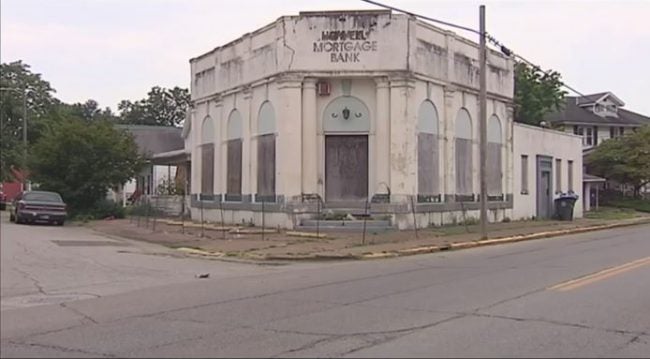Decrepit bank highlights pitfalls of tax sale system
VANDERBURGH COUNTY, Ind. (WEHT) — It is just one of more than 600 properties that are up for sale at Vanderburgh County’s annual tax sale. But a century-old building on Evansville’s west side is emblematic of what some describe as a broken system.
Built in the early 1900s, the former Howell Mortage Bank at 3000 Broadway Avenue has been a frequent flyer on the county’s tax sale list. According to property records, it has gone unsold at the annual tax sale every year since at least 2013. It has had five different owners — many of whom are limited liability companies — in the past decade.
If history is any indication, it will likely go unsold again at the 2017 tax sale, which is scheduled for August 24th.
According to property records, 3000 Broadway LLC, a company based in Cape Coral, Florida, owes more than $20,000 in back property taxes and liens. The limited liability corporation took ownership of the property in 2010.
It was about that time when neighbor Mona Berry began to lose patience.
“I have been working on that building for seven years and I have gotten nowhere,” Berry said. “I’ve been calling on that place every year, twice a year.”
The Building Commission knows her by name, she said, after repeated calls and complaints about the condition and potential safety hazards at the property. A small temporary fence was installed but one end is open, allowing anyone to get past the closed-off area. Plywood boards now cover where the shattered windows once were. The giant crack in the front of the building particularly concerns her.
“Broadway is a heavily traveled street. What if the building falls down and falls into the lane of traffic?” Berry said. “Who is going to get killed?”
As is the fate of many vacant commercial properties, the former bank is in limbo.
In Indiana, if a property owner fails to pay the property taxes for three consecutive installments, a property goes to the county tax sale. At the tax sale, potential buyers and speculative investors can bid on these properties.
But they’re buying the debt — not the dirt.
Many speculative investors will purchase these tax-deliquent properties with the hope that the owner will pay up on their property taxes within the one year redemption period. If the owner does indeed pay up, they are required to pay an additional 10% of the total tax lien. The speculative investor then re-coups that amount.
“[Investors] won’t bid on them because they don’t want to owe all the money that’s there,” said Kelley Coures, the executive director of the Department of Metropolitan Development. “That’s the hazard of having that process in place. Nothing happens to those properties for decades.”
The city’s landbank can’t take ownership of the property because it’s a commercial property. Neither than the county. Therefore, these commercial properties stay on the tax sale lists for years because there are no legal mechanisms in place other than the tax sale process.
It is a vicious cycle and neighborhoods pay the price.
“It has a detrimental affect on property values and surrounding residential property values,” Coures said. “It has an impact on what you can buy or sell your home for.”
In a twist of irony, Berry received her home mortgage from the former Howell bank. Now, 45 years later, the former bank is affecting her home’s value.
“Any debris that comes out of that place seems to manage to get down here at the end of the street,” Berry said. “I’m just frustrated by the whole mess.”
